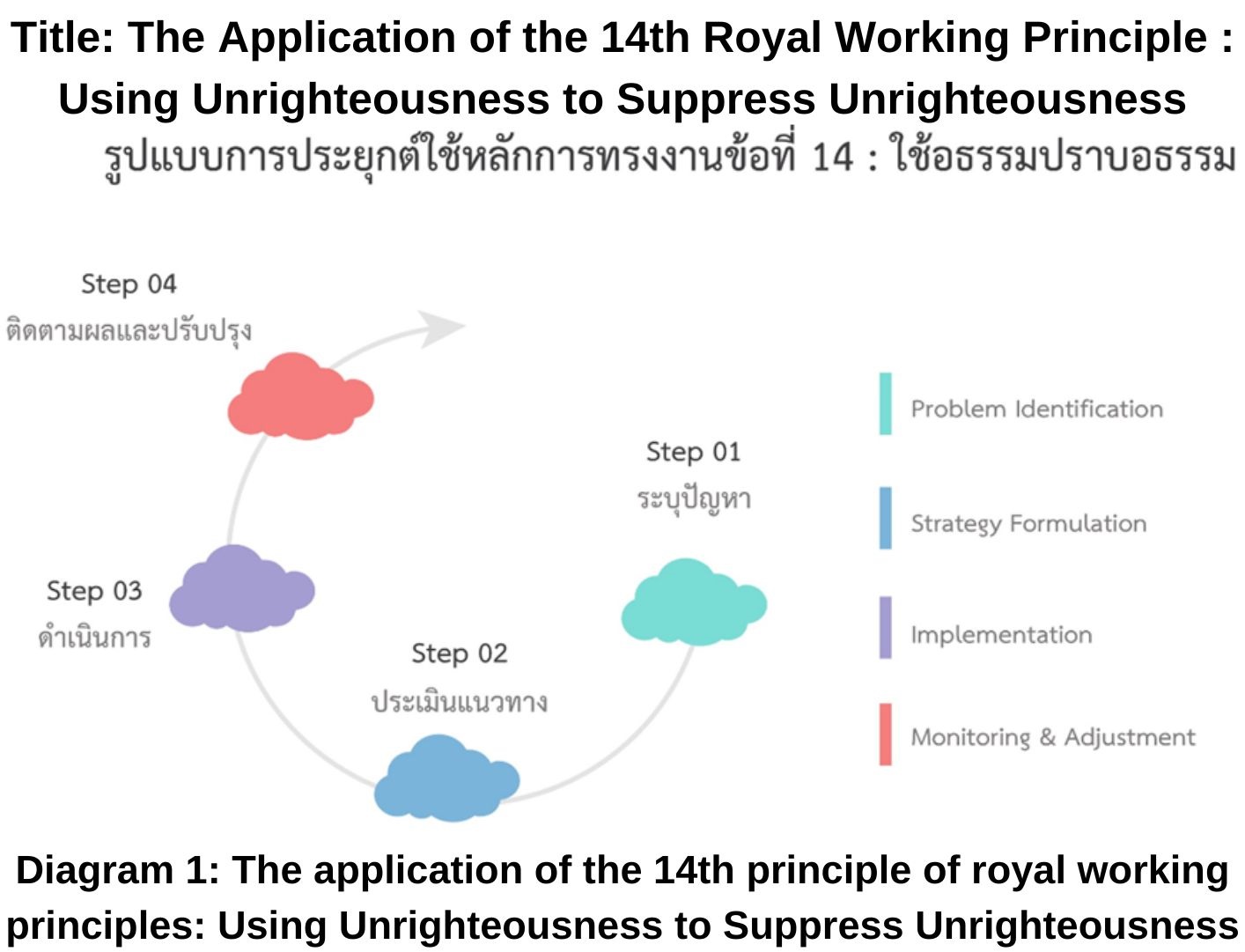The Application of the 14th Royal Working Principle : Using Unrighteousness to Suppress Unrighteousness
Keywords:
Application, the 14th Royal Working Principle, Unrighteousness to Suppress UnrighteousnessAbstract
This study aims to analyze and apply the 14th Royal Working Principle: Using Unrighteousness to Suppress Unrighteousness, utilizing philosophical, ethical, and practical approaches to address social, economic, political, and environmental issues. The study found that the principle of "Using Unrighteousness to Suppress Unrighteousness" can be applied in four main dimensions: (1) Environment, such as using invasive plants for wastewater treatment; (2) Economy, such as integrating the informal economy into a structured economic system; (3) Organizational Management, such as transforming internal conflicts into a source of creativity; and (4) Social Problem-Solving, such as involving former offenders in crime prevention initiatives.
In the context of this study, the term "unrighteousness" does not directly refer to immoral actions. Instead, it signifies strategies or measures that may not align with conventional practices or fall outside traditional frameworks for problem-solving. However, these approaches are employed with the goal of restoring balance and addressing societal issues without fostering new forms of unrighteousness.
The findings led to the development of a framework for applying the 14th Royal Working Principle, structured as a four-step process: (1) Problem Identification, (2) Strategy Evaluation, (3) Implementation, and (4) Monitoring and Adjustment-all based on ethical principles, checks and balances, and long-term social impact considerations. This approach provides a balanced method for managing complex problems and contributes to sustainable development. However, careful oversight is necessary to prevent ethical violations or the unintended reinforcement of a new form of unrighteousness.
References
พิเชษฐ พิณทอง. (2554). การใช้อำนาจหน้าที่เกินขอบเขตของตำรวจ : ผลกระทบด้านมนุษยชน. วารสารกระบวนการยุติธรรม, 4(1), 33-46
ฤทัยรัตน์ ชิดมงคล. (2560). การคิดเชิงระบบ : ประสบการณ์การสอนเพื่อพัฒนาการคิดเชิงระบบ. วารสารครุศาสตร์, 45(2), 209-224.
สำนักงานคณะกรรมการพิเศษเพื่อประสานงานโครงการอันเนื่องมาจากพระราชดำริ (สำนักงาน กปร.). (2559). หลักการทรงงานในพระบาทสมเด็จพระบรมชนกาธิเบศร มหาภูมิพลอดุลยเดชมหาราช บรมนาถบพิตร. (พิมพ์ครั้งที่ 11). กรุงเทพฯ : สำนักงาน กปร.
Harvey, P. (2000). An introduction to Buddhist ethics. Cambridge, UK: Cambridge University Press.
Kant, I. (1993). Grounding for the metaphysics of morals (J. W. Ellington, Trans.). Indianapolis, IN: Hackett Publishing Company. (Original work published 1785)
Laozi. (2003). Tao Te Ching (D. C. Lau, Trans.). London, UK: Penguin Classics.
Machiavelli, N. (2008). The prince (W. K. Marriott, Trans.). Oxford, UK: Oxford University Press. (Original work published 1513)
MacIntyre, A. (2007). After virtue: A study in moral theory (3rd ed.). Notre Dame, IN: University of Notre Dame Press.
Mill, J. S. (1863). Utilitarianism. London, UK: Parker, Son, and Bourn.
Mill, J.S. (1951). Utilitarianism, Liberty and Representative Government. New York: E.P. Dutton and Company Inc.
Rawls, J. (1999). A theory of justice (Revised ed.). Cambridge, MA: Harvard University Press.

Downloads
Published
How to Cite
Issue
Section
License
Copyright (c) 2025 Institute of Sufficiency Journal

This work is licensed under a Creative Commons Attribution-NonCommercial-NoDerivatives 4.0 International License.



